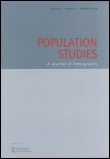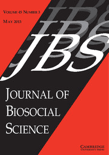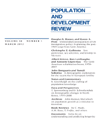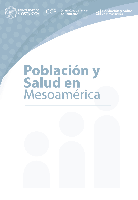
POPULATION RESEARCH AND POLICY REVIEW
Scope & Guideline
Transforming Insights into Actionable Policy
Introduction
Aims and Scopes
- Population Dynamics and Demographic Trends:
The journal explores various aspects of population dynamics, including migration patterns, fertility rates, and aging populations, providing insights into how these trends affect social structures and policy making. - Health Disparities and Access:
Research published in this journal often addresses health disparities across different racial, ethnic, and socioeconomic groups, emphasizing the importance of equitable access to healthcare services and the impact of public health policies. - Socioeconomic Factors and Inequality:
The journal investigates the intersection of socioeconomic status with demographic variables, focusing on how income, education, and employment influence population health and family structures. - Policy Analysis and Evaluation:
A significant portion of the journal's content involves analyzing and evaluating public policies related to population issues, including immigration, reproductive health, and welfare, thereby contributing to evidence-based policy formulation. - Cultural and Social Dimensions:
The journal emphasizes the role of cultural and social factors in shaping demographic behaviors, such as family formation, childrearing practices, and attitudes towards fertility and migration.
Trending and Emerging
- Impact of COVID-19 on Population Dynamics:
A significant increase in research examining the effects of the COVID-19 pandemic on fertility, migration, and health disparities has emerged, showcasing the pandemic's profound influence on demographic trends. - Intersectionality in Health and Demography:
There is a growing focus on intersectional approaches that analyze how overlapping identities (such as race, gender, and socioeconomic status) impact health outcomes and demographic behaviors, reflecting a more comprehensive understanding of social inequalities. - Policy Responses to Migration and Integration:
Recent studies have increasingly addressed how various policies affect migrant populations, including their health, economic integration, and social acceptance, highlighting the importance of responsive policy frameworks. - Sustainability and Environmental Factors:
Research exploring the intersection of population dynamics and environmental sustainability is on the rise, as scholars investigate how demographic trends impact and are impacted by climate change and resource management.
Declining or Waning
- Traditional Fertility Studies:
Research focusing solely on traditional fertility rates and patterns has seen a decrease, possibly due to the growing recognition of the multidimensional factors affecting reproductive choices, including economic and social influences. - Static Migration Patterns:
Studies that analyze migration trends without considering the dynamic nature of migration drivers (such as climate change and globalization) have become less frequent, indicating a shift towards more complex analyses. - Conventional Gender Roles in Demography:
Research examining rigid gender roles in fertility and family dynamics has waned, as contemporary studies increasingly explore more fluid and diverse gender identities and their implications for demographic behaviors.
Similar Journals

POPULATION AND ENVIRONMENT
Illuminating the Interplay Between People and PlanetPopulation and Environment is a renowned journal published by Springer, focusing on the critical intersection between demographic processes and environmental changes. Established in 1980, the journal has become a leading platform for interdisciplinary research, with its impressive impact reflected in its 2023 rankings, placing it in the Q1 quartile for both Demography and Environmental Science (miscellaneous) categories. With Scopus Ranks highlighting its prominent position (#11 out of 139 in Social Sciences – Demography, and #46 out of 219 in Environmental Science), Population and Environment fosters a rich dialogue among researchers, professionals, and students dedicated to understanding how population dynamics influence environmental conditions and vice versa. Operating without an open access option, the journal ensures high standards for scholarly contributions and remains committed to bridging knowledge gaps in the realms of population studies and environmental science. The journal's rigorous peer-review process and comprehensive archive from 1980 to 2024 solidify its reputation as an invaluable resource for advancing research and informing policy in these critical fields.

European Journal of Population-Revue Europeenne de Demographie
Connecting Scholars to the Heart of DemographyWelcome to the European Journal of Population-Revue Europeenne de Demographie, a premier scholarly publication dedicated to advancing the field of demography. Published by Springer since 1985, this journal has established itself as a vital resource for researchers, professionals, and students interested in population studies, evidenced by its Q1 ranking in Demography for 2023 and a notable Scopus ranking within the top 20% of its category. With an ISSN of 0168-6577 and an E-ISSN of 1572-9885, the journal provides a platform for high-quality, peer-reviewed research, contributing to the understanding of population dynamics and demographic trends across Europe and beyond. Although currently not open access, the journal ensures broad mobility of knowledge through diverse access options, aspiring to bridge theoretical insights and practical applications crucial for policy-making and societal engagement. Join us in exploring the intricate tapestry of demographic data as we examine pressing issues such as migration, fertility, mortality, and population aging in an ever-evolving global context.

Revista Latinoamericana de Poblacion
Fostering Insight into Demographic Trends Across Latin AmericaRevista Latinoamericana de Poblacion is a distinguished open-access journal dedicated to the field of population studies, published by the Asociación Latinoamericana de Población. Since its inception in 2007, the journal has aimed to foster scholarly dialogue and disseminate critical research on demographic dynamics across Latin America. With an emphasis on diverse methodologies and interdisciplinary approaches, the journal serves as a platform for researchers, professionals, and students to engage with pressing issues such as migration, fertility, aging, and socio-economic factors influencing population trends. As an invaluable resource for the academic community, this journal not only promotes accessibility to vital research through its open-access model but also plays a crucial role in enhancing the understanding of demographic changes and their implications in the region. By focusing on the unique context of Latin America, Revista Latinoamericana de Poblacion facilitates a deeper insight into population phenomena that resonate globally.

POPULATION STUDIES-A JOURNAL OF DEMOGRAPHY
Connecting Historical Contexts with Modern Demographic InsightsPopulation Studies: A Journal of Demography is an esteemed scholarly publication dedicated to advancing the understanding of demographic trends and their historical contexts. Published by Routledge Journals, Taylor & Francis Ltd, this journal has a notable impact in its field, recognized as a Q1 category journal in both Demography and History as of 2023. Its Scopus rankings highlight its significance, featuring a remarkable 12th place rank in Arts and Humanities—History and 19th place in Social Sciences—Demography, both underscoring its influential role in academic research. Established in 1947, the journal has consistently contributed to the discourse in population studies, offering a platform for innovative research and critical analysis. While it does not provide open access options, it remains a vital resource for researchers, professionals, and students who seek to explore the complex relationships between population dynamics and historical narratives. Its comprehensive coverage from 1947 to 2024 ensures a rich repository of knowledge, making it essential for anyone involved in demographic research.

JOURNAL OF BIOSOCIAL SCIENCE
Unraveling the Complex Ties Between Biology and SocietyJOURNAL OF BIOSOCIAL SCIENCE, published by Cambridge University Press, is a pivotal interdisciplinary journal dedicated to advancing our understanding of the complex interplay between biological and social factors in human health and society. With an ISSN of 0021-9320 and an E-ISSN of 1469-7599, this journal has been a cornerstone of scholarly communication since its inception in 1969, paving the way for innovative research until 2024 and beyond. The journal is ranked in the Q3 quartile in Public Health, Environmental and Occupational Health and Q2 in Social Sciences (miscellaneous), reflecting its significant impact in these fields. Its Scopus ranking further emphasizes its relevance, sitting at #79 out of 275 in General Social Sciences and #334 out of 665 in Public Health. Researchers, professionals, and students are encouraged to explore the journal's rich repository of articles that delve into critical biosocial issues, fostering a deeper understanding of how social structures influence health and well-being. Although not open access, the journal remains an essential resource for those committed to addressing contemporary health challenges through a biosocial lens.

Journal of Demographic Economics
Shaping Policy with Rigorous Demographic AnalysisThe Journal of Demographic Economics, published by Cambridge University Press, stands as a leading interdisciplinary platform dedicated to the exploration and advancement of research in the intertwined fields of demography, economics, and geography. With an impact factor that reflects its esteemed position—ranking in the Q1 quartile for Demography (2023)—the journal fosters scholarly dialogue through high-quality articles that elucidate the complex interactions between population dynamics and economic trends. Operating under an open access model, the journal ensures that its findings are widely accessible, promoting inclusivity and engagement among researchers, professionals, and students alike. The Journal of Demographic Economics endeavors to bridge gaps in knowledge by publishing innovative and rigorous studies, thereby contributing significantly to both theoretical frameworks and practical applications across various domains. Drawing submissions from a global audience, this journal not only enhances the understanding of demographic transitions but also informs policy decisions and socioeconomic development strategies, making it an essential resource for those invested in demographic and economic research.

POPULATION AND DEVELOPMENT REVIEW
Unpacking the Interplay Between Population Changes and Development Strategies.Population and Development Review is a prestigious academic journal published by Wiley, recognized for its comprehensive exploration of the intersections between population dynamics and development processes. Since its inception in 1976, the journal has contributed significantly to the field, featuring rigorous peer-reviewed articles that address pressing issues in demography, development, and sociology, maintaining a commendable reputation with a Q1 ranking across multiple categories as of 2023. With an impact factor that reflects its influence—ranking in the 90th percentile in Sociology and Political Science, and 85th percentile in Development—this journal serves as a vital resource for researchers, policy-makers, and students alike. It is instrumental in fostering dialogue and disseminating knowledge that shapes and informs public policy and academic inquiry. Although not an open-access publication, it remains accessible through various academic institutions, ensuring that its valuable insights are available to a broad audience eager to engage with the complexities of population and development.

POPULATION
Empowering Scholars with Critical Demographic InsightsPopulation, an esteemed journal published by the Institut National d'Études Démographiques (INED), serves as a critical platform for the dissemination of high-quality research in the field of demography. With the ISSN 0032-4663 (Print) and E-ISSN 1957-7966 (Online), this journal covers a wide spectrum of topics related to population studies, including migration, fertility, mortality, and population policy, offering a comprehensive lens on demographic trends that influence societies worldwide. Although it operates under a traditional subscription model, its rigorous peer-review process ensures that only the most impactful and relevant research findings are published. With its long-standing reputation among scholars and practitioners in the demographic domain, Population plays a vital role in shaping the academic discourse and guiding future research directions. Scholars, professionals, and students alike will find in its pages not only innovative perspectives but also critical insights that reflect the complexities of population dynamics in a rapidly changing world. For those dedicated to understanding the demographic challenges that societies face today, this journal remains an invaluable resource.

Journal of the Economics of Ageing
Advancing Understanding of Ageing and EconomicsJournal of the Economics of Ageing, published by ELSEVIER, is a leading international journal dedicated to exploring the economic aspects of ageing in the global context. With an ISSN of 2212-828X, it aims to provide a platform for innovative research that addresses the socio-economic implications of demographic shifts, particularly those related to life-span and life-course studies. Since its inception in 2013, the journal has rapidly established itself within the Q2 category in both the Economics and Econometrics and Life-span and Life-course Studies fields, reflecting its significant contribution to these disciplines. Based in the Netherlands, this journal is indexed with a respectable percentile ranking, such as 69th in Life-span and Life-course Studies, confirming its value to researchers and professionals alike. Committed to disseminating impactful research, the Journal of the Economics of Ageing ultimately seeks to influence policy and funding decisions that shape the future of ageing populations.

Poblacion y Salud en Mesoamerica
Exploring Population Trends for a Healthier TomorrowPoblacion y Salud en Mesoamerica is a pivotal open-access journal published by the University of Costa Rica's Centro Centroamericano Poblacion. With an ISSN of 1659-0201 and an E-ISSN of the same, this journal has been dedicated since 2003 to advancing the fields of demography, epidemiology, health informatics, and public health within the Mesoamerican region. Addressing critical health and population issues, it aims to foster a deeper understanding of demographic trends and their implications on health policies. As of 2023, the journal ranks in the Q4 quartile across several categories, reflecting its commitment to publishing quality research while serving as a platform for emerging scholars and seasoned professionals alike. Although it is currently in the lower quartile ranks, the journal seeks to establish itself as a vital resource in the context of Mesoamerican social sciences and health, making it an essential tool for researchers and practitioners interested in regional population health dynamics. Its editorial board is comprised of experts dedicated to enhancing the scholarly conversation surrounding population health and policy in Central America.